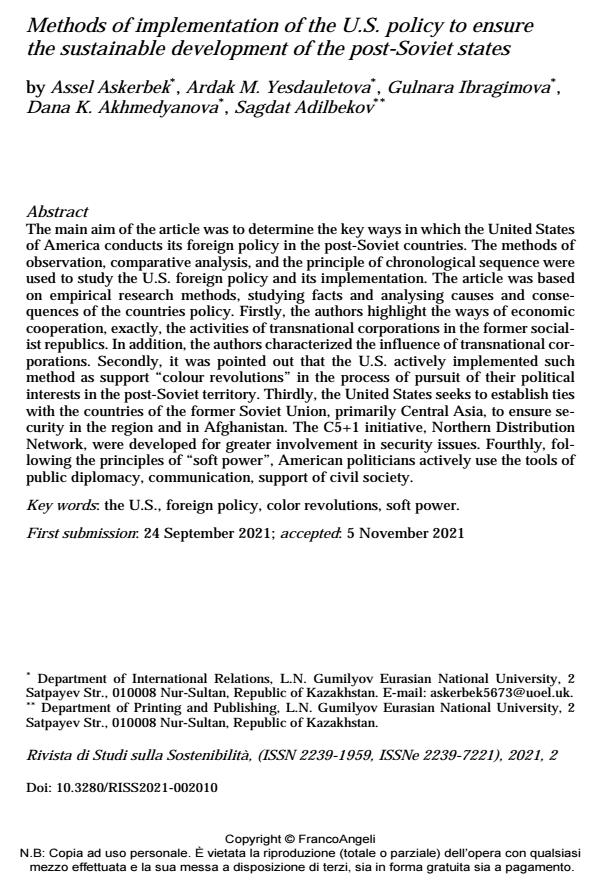Methods of implementation of the U.S. policy to ensure the sustainable development of the post-Soviet states
Titolo Rivista RIVISTA DI STUDI SULLA SOSTENIBILITA'
Autori/Curatori Assel Askerbek, Ardak M. Yesdauletova, Gulnara Ibragimova, Dana K. Akhmedyanova, Sagdat Adilbekov
Anno di pubblicazione 2022 Fascicolo 2021/2
Lingua Inglese Numero pagine 13 P. 127-139 Dimensione file 100 KB
DOI 10.3280/RISS2021-002010
Il DOI è il codice a barre della proprietà intellettuale: per saperne di più
clicca qui
Qui sotto puoi vedere in anteprima la prima pagina di questo articolo.
Se questo articolo ti interessa, lo puoi acquistare (e scaricare in formato pdf) seguendo le facili indicazioni per acquistare il download credit. Acquista Download Credits per scaricare questo Articolo in formato PDF

FrancoAngeli è membro della Publishers International Linking Association, Inc (PILA)associazione indipendente e non profit per facilitare (attraverso i servizi tecnologici implementati da CrossRef.org) l’accesso degli studiosi ai contenuti digitali nelle pubblicazioni professionali e scientifiche
The main aim of the article was to determine the key ways in which the United States of America conducts its foreign policy in the post-Soviet countries. The methods of observation, comparative analysis, and the principle of chronological sequence were used to study the U.S. foreign policy and its implementation. The article was based on empirical research methods, studying facts and analysing causes and consequences of the countries policy. Firstly, the authors highlight the ways of economic cooperation, exactly, the activities of transnational corpora-tions in the former socialist republics. In addition, the authors characterized the influence of transnational corporations. Secondly, it was pointed out that the U.S. actively implemented such method as support "colour revolutions" in the process of pursuit of their political interests in the post-Soviet territory. Thirdly, the United States seeks to establish ties with the countries of the former Soviet Union, primari-ly Central Asia, to ensure security in the region and in Afghanistan. The C5+1 initi-ative, Northern Distribution Network, were developed for greater involvement in security issues. Fourthly, following the principles of "soft power", American politi-cians actively use the tools of public diplomacy, communication, support of civil society.
Parole chiave:the U.S., foreign policy, color revolutions, soft power.
Assel Askerbek, Ardak M. Yesdauletova, Gulnara Ibragimova, Dana K. Akhmedyanova, Sagdat Adilbekov, Methods of implementation of the U.S. policy to ensure the sustainable development of the post-Soviet states in "RIVISTA DI STUDI SULLA SOSTENIBILITA'" 2/2021, pp 127-139, DOI: 10.3280/RISS2021-002010